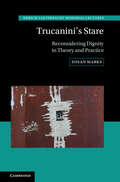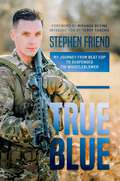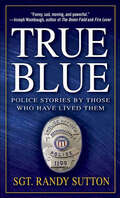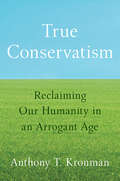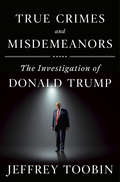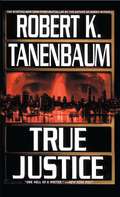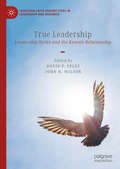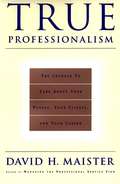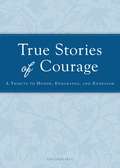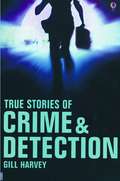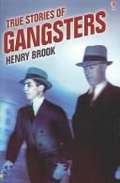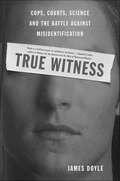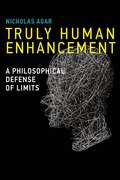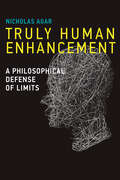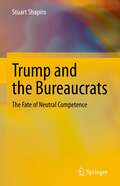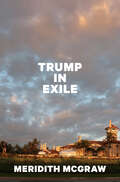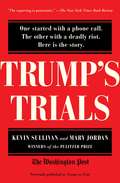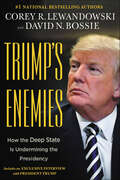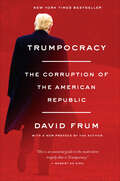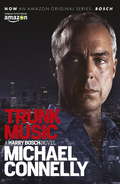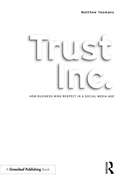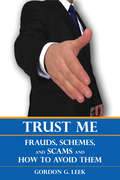- Table View
- List View
Trucanini's Stare: Reconsidering Dignity in Theory and Practice (Hersch Lauterpacht Memorial Lectures)
by Susan MarksA central concept in international human rights law and many national constitutions is human dignity. Departing from established approaches to dignity in philosophy and legal theory, Susan Marks takes dignity in everyday life ('dignified care', 'dignity in the workplace', etc.) as a starting point for reconsidering the concept's history and significance. The result is a highly original work which gives particular attention to colonial and post-colonial engagements with dignity, and emphasises the character of human dignity as not just an idea or abstract value, but also a lived experience that cannot be understood without reference to social structures and the inequalities and hierarchies they reproduce. If dignity is an attribute which all human beings possess purely by virtue of being human, Marks shows that it is also an element within the systemic operations of privilege and power.
True American: Language, Identity, and the Education of Immigrant Children
by Rosemary C. SalomoneHow can schools meet the needs of an increasingly diverse population of newcomers? Do bilingual programs help children transition into American life, or do they keep them in a linguistic ghetto? Are immigrants who maintain their native language uninterested in being American, or are they committed to changing what it means to be American? In this ambitious book, Rosemary Salomone uses the heated debate over how best to educate immigrant children as a way to explore what national identity means in an age of globalization, transnationalism, and dual citizenship. She demolishes popular myths—that bilingualism impedes academic success, that English is under threat in contemporary America, that immigrants are reluctant to learn English, or that the ancestors of today’s assimilated Americans had all to gain and nothing to lose in abandoning their family language. She lucidly reveals the little-known legislative history of bilingual education, its dizzying range of meanings in different schools, districts, and states, and the difficulty in proving or disproving whether it works—or defining it as a legal right. In eye-opening comparisons, Salomone suggests that the simultaneous spread of English and the push toward multilingualism in western Europe offer economic and political advantages from which the U.S. could learn. She argues eloquently that multilingualism can and should be part of a meaningful education and responsible national citizenship in a globalized world.
True Blue: My Journey from Beat Cop to Suspended FBI Whistleblower
by Stephen FriendA suspended special agent explains his decision to turn whistleblower and expose FBI politicization and abuse against conservative America.Stephen Friend had his dream job as an FBI special agent. After nearly a decade of combating violent crime, human trafficking, and child predators, he was reassigned to the FBI&’s unprecedented investigation of the political unrest at the United States Capitol on January 6, 2021. Friend soon uncovered efforts by the FBI and Department of Justice to manipulate statistics and exaggerate the nationwide threat of domestic terrorism. Friend spotlighted how the politicized FBI was cooking the books to support an ongoing narrative from the Joe Biden administration to label Donald Trump voters as violent extremists. Friend witnessed overzealous practices to harass conservative Americans and realized the FBI was turning its investigative processes into a punishment. When the married father of two made his bombshell allegations in a whistleblower disclosure, leaders within the FBI exposed themselves as partisan, ambitious players who insisted that January 6th protestors killed police officers and attempted to seize American democracy. Hell-bent on suppressing Friend from exposing the truth, FBI officials seized his gun and badge and suspended him from working as a special agent. In this memoir, Friend reflects on the lessons and life experiences that led him to ultimately risk his career to uphold his FBI special agent oath to protect and defend the United States Constitution against all enemies—both foreign and domestic.
True Blue: Police Stories by Those Who Have Lived Them
by Randy SuttonAfter September 11, 2001 Las Vegas Police Sergeant Randy Sutton began soliciting writing from law enforcement officers-his goal being to bridge the gap between the police and those they serve, with a book that offers a broad and thoughtful look at the many facets of police life. Hundreds of active and former officers responded from all over the United States: men and women from big cities and small towns, some who had written professionally, but most for the first time. Sutton culled the selections into five categories: The Beat, Line of Duty, War Stories, Officer Down, and Ground Zero. The result is True Blue, a collection of funny, charming, exciting, haunting stories about murder investigations, missing children, bungling burglars, car chases, lonely and desperate shut-ins, routine traffic stops, officers killed in the line of duty, and the life-changing events of September 11. Here, officers reveal their emotions-fear and pride, joy and disgust, shame and love-as they recount the defining moments of their careers. In these stories, the heart and soul behind the badge shines through in unexpected ways. True Blue will change the way we think about the deeply human realm of police service.
True Conservatism: Reclaiming Our Humanity in an Arrogant Age
by Anthony T. KronmanDrawing on the riches of the Western tradition, Anthony T. Kronman defends a humane conservativism for our enlightened age As the party of the left has grown more strident, its conservative critics have responded in kind. Each year conservatives do a poorer job of defending their position as a citadel of human values without lapsing into an angry assault on ideals that they and progressives share. It becomes harder to see the enduring appeal of a true conservatism that celebrates the worth of custom and inheritance; the splendor of what is excellent and rare; the expansive solidarity of our friendship with the dead; and the dignity, indeed necessity, of our longing for a connection to the eternal and divine—while affirming that these timeless human goods are compatible with the modern ideals of equality, toleration, and reasoned argument. In this bracing book, Anthony Kronman defends a conservative philosophy of life that respects our enlightened ideals but decries the damage their arrogant simplification causes in our moral, political, and spiritual lives. Drawing on the work of Aristotle, Cicero, Spinoza, Burke, Hume, Madison, Tocqueville, Lincoln, Arendt, Heidegger, and others, he argues that humanism is conservatism, today as in the past. He reminds us that our humbling parameters make possible every form of human greatness, every human glory, every human love worthy of the name.
True Crimes and Misdemeanors: The Investigation of Donald Trump
by Jeffrey ToobinFrom CNN chief legal analyst and bestselling author Jeffrey Toobin, a real-life legal thriller about the prosecutors and congressional investigators pursuing the truth about Donald Trump's complicity in several crimes--and why they failed.Donald Trump's campaign chairman went to jail. So did his personal lawyer. His long-time political consigliere was convicted of serious federal crimes, and his national security advisor pled guilty to others. Several Russian spies were indicted in absentia. Career intelligence agents and military officers were alarmed enough by the president's actions that they alerted senior government officials and ignited the impeachment process. <P><P>Yet despite all this, a years-long inquiry led by special counsel Robert Mueller, and the third impeachment of a president in American history, Donald Trump survived to run for re-election. Why?Jeffrey Toobin's highly entertaining definitive account of the Mueller investigation and the impeachment of the president takes readers behind the scenes of the epic legal and political struggle to call Trump to account for his misdeeds. With his superb storytelling and analytic skills Toobin recounts all the mind-boggling twists and turns in the case--Trump's son met with a Russian operative promising Kremlin support! <P><P>Trump paid a porn star $130,000 to hush up an affair! Rudy Giuliani and a pair of shady Ukrainian-American businessmen got the Justice Department to look at Russian-created conspiracy theories! Toobin shows how Trump's canny lawyers used Mueller's famous integrity against him, and how Trump's bullying and bluster cowed Republican legislators into ignoring the clear evidence of the impeachment hearings.Based on dozens of interviews with prosecutors in Mueller's office, Trump's legal team, Congressional investigators, White House staffers, and several of the key players, including some who are now in prison, True Crimes and Misdemeanors is a revelatory narrative that makes sense of the seemingly endless chaos of the Trump years. <P><P>Filled with never-before-reported details of the high-stakes legal battles and political machinations, the book weaves a tale of a rogue president guilty of historic misconduct, and how he got away with it. <P><P><b>A New York Times bestseller</b>
True Justice (A Butch Karp-Marlene Ciampi Thriller #12)
by Robert K. TanenbaumNew York Times bestselling author Robert K. Tanenbaum has more than seven million copies of his finely crafted and morally complex novels in print. In True Justice, he reaches new heights with a compellingly authentic and penetrating story pulled right form today's most controversial headlines.For Butch Karp, chief assistant district attorney for New York County, the nightmare begins when a shocking act of negligence results in homicide. Goaded by the media's sensational publicity, the public is screaming for blood, and Karp's boss, D.A. Jack Keegan, is listening. He has ordered the prosecution of a fifteen-year-old for murder, intent on making a very public example of the girl. A Hispanic from a poor neighborhood, she's an easy mark for big-city bureaucracy and bigotry. It is Butch Karp's unpleasant job to see that the prosecution gives the public what it wants: a quick and thorough administration of hard-line justice.Complicating matters further is Butch's wife, Marlene Ciampi, a private investigator who has decided to return to practicing law. Her first case takes her a few hundred miles south to a small Delaware town, where an equally unspeakable tragedy has taken place. Marlene, however, has the unenviable task of taking on a politically ambitious local prosecutor who is pressing to charge a suburban teenager with capital murder.With Butch and Marlene squaring off on opposite sides of an increasingly incendiary national debate, things couldn't get any more tense...until a shocking turn of events puts their daughter, Lucy, at the center of a horrifying crime. Suddenly, everything they believe in is challenged, and they are drawn into a maelstrom of big-city politics and small-town values, where justice is sacrificed to the twin gods of public perception and expediency -- and Karp must struggle to salvage his self-respect, his career, and his life.
True Leadership: Leadership Styles and the Kenotic Relationship (Christian Faith Perspectives in Leadership and Business)
by David P. Peltz John H. WilsonThis edited collection addresses several forms of moral leadership within the context of kenosis, bringing together both secular and biblical perspectives on the role of morality and self-sacrifice in effective leadership theory and practice. The contributors apply various leadership theories in the analysis of sacred texts in order to uncover unique insights into the biblical truth about leadership. Their analysis moves away from egotistical leadership focused on self-aggrandizement and provides a new model for leadership - one characterized by morality, authenticity, and service. True Leadership will benefit scholars, researchers, and students interested in values-based leadership and seeking to enrich their understanding of organizational behavior and leadership development.
True Professionalism: The Courage to Care About Your People, Your Clients, and Your Career
by David H. MaisterDavid Maister, the world's premier consultant to professional service firms, vigorously challenges professionals to examine this essential, yet under-addressed question: What is true professionalism?Professional firms are forever trying to get their people to act like professionals—to do the right things. Though their various incentives may create employee compliance, these don't often encourage excellence. His answer is clear: It is believing passionately in what you do, never compromising your standards and values, and caring about your clients, your people and your own career. In clear and compelling terms, Maister shows that this approach is not only ethical but also conducive to commercial success.
True Stories of Courage: A tribute in honor, endurance, and endeavor (Cup of Comfort Stories)
by Colleen SellIn True Stories of Courage, you’ll find the heroines and heroes who have transformed the lives of everyone who knows them. These three stories will kindle your spirit and offer you hope whenever you need it. It’s nothing less than a supporting friend a powerful mentor in times of struggle—and triumph.
True Stories of Crime and Detection
by Gill HarveyAre real criminals and detectives anything like the ones you read about in novels or see on the television? You can find out in these ten exciting true stories.
True Stories of Gangsters
by Henry BrookFrom Al Capone's reign of terror in Chicago to the last stand of Ned Kelly in the Australian bush, most gangsters lived lives of cold, calculating violence, living hard and dying young. Here are the true tales of famous gangsters.
True Witness: Cops, Courts, Science, and the Battle against Misidentification
by James DoyleHonest but mistaken eyewitnesses are the leading cause of wrongful convictions in the United States. As the innocent go to prison their lives are shattered; as the criminal goes free, the public remains vulnerable. With a vivid cast of brilliant scientists, street-wise cops, and former prosecutors--all haunted by the legacy of wrongful convictions, some directly involved with one--Doyle sheds light on the intersection of personal ambition, legal and political principles, and scientific inquiry. He highlights real possibilities for improved identification, their challenges to the legal tradition, and persuasively argues that the promises of improved justice must be realized before another wrongful conviction lets the guilty go free. This is an important look at a pressing issue in the news with every exoneration.
Truly Human Enhancement
by Nicholas AgarThe transformative potential of genetic and cybernetic technologies to enhance human capabilities is most often either rejected on moral and prudential grounds or hailed as the future salvation of humanity. In this book, Nicholas Agar offers a more nuanced view, making a case for moderate human enhancement -- improvements to attributes and abilities that do not significantly exceed what is currently possible for human beings. He argues against radical human enhancement, or improvements that greatly exceeds current human capabilities. Agar explores notions of transformative change and motives for human enhancement; distinguishes between the instrumental and intrinsic value of enhancements; argues that too much enhancement undermines human identity; considers the possibility of cognitively enhanced scientists; and argues against radical life extension. Making the case for moderate enhancement, Agar argues that many objections to enhancement are better understood as directed at the degree of enhancement rather than enhancement itself. Moderate human enhancement meets the requirement of truly human enhancement. By radically enhancing human cognitive capabilities, by contrast, we may inadvertently create beings ("post-persons") with moral status higher than that of persons. If we create beings more entitled to benefits and protections against harms than persons, Agar writes, this will be bad news for the unenhanced. Moderate human enhancement offers a more appealing vision of the future and of our relationship to technology.
Truly Human Enhancement: A Philosophical Defense of Limits (Basic Bioethics)
by Nicholas AgarA nuanced discussion of human enhancement that argues for enhancement that does not significantly exceed what is currently possible for human beings.The transformative potential of genetic and cybernetic technologies to enhance human capabilities is most often either rejected on moral and prudential grounds or hailed as the future salvation of humanity. In this book, Nicholas Agar offers a more nuanced view, making a case for moderate human enhancement—improvements to attributes and abilities that do not significantly exceed what is currently possible for human beings. He argues against radical human enhancement, or improvements that greatly exceed current human capabilities.Agar explores notions of transformative change and motives for human enhancement; distinguishes between the instrumental and intrinsic value of enhancements; argues that too much enhancement undermines human identity; considers the possibility of cognitively enhanced scientists; and argues against radical life extension. Making the case for moderate enhancement, Agar argues that many objections to enhancement are better understood as directed at the degree of enhancement rather than enhancement itself. Moderate human enhancement meets the requirement of truly human enhancement. By radically enhancing human cognitive capabilities, by contrast, we may inadvertently create beings (“post-persons”) with moral status higher than that of persons. If we create beings more entitled to benefits and protections against harms than persons, Agar writes, this will be bad news for the unenhanced. Moderate human enhancement offers a more appealing vision of the future and of our relationship to technology.
Trump and the Bureaucrats: The Fate of Neutral Competence
by Stuart ShapiroThis volume discusses the long term impacts of the Trump presidency on the federal bureaucracy. Drawing on the longstanding academic literature on neutral competence and interviews with the bureaucrats themselves, this book adds insight to the academic question of the role of bureaucrats in a democratic system after a four-year period in which their role has been questioned and threatened as never before. Focusing on the elite agencies of the Office of Management and Budget, the Congressional Budget Office, the Government Accountability Office, as well as the Economic Research Service at the Department of Agriculture, the chapters evaluate individual experiences of members of each agency during the Trump presidency through the lens of the growing tension between politics and administration. Enlightening the role that bureaucrats play in American democracy in an era when polarization is on the rise and disputes over the role of the civil service are growing, this volume will be of interest to scholars and students in public policy, political science, and public administration as well as policymakers and members of the US federal government workforce.
Trump in Exile
by Meridith McGrawFilled with deep insights and never-before-seen details, Trump in Exile is an explosive, all-access account from behind the scenes at Mar-a-Lago as former president Donald Trump regroups from an election defeat that he refuses to acknowledge and plots his return. The Capitol riots on January 6, 2021, put a horrific closing note on a norm-shattering presidency, as the twice-impeached Donald Trump rode a wave of denial and resentment out of 1600 Pennsylvania Avenue and crashed back at Mar-a-Lago—seemingly wounded, seemingly done. But he wasn&’t. And what, exactly, was he building in there? Meridith McGraw vividly chronicles the incredible period of Trump&’s exile in South Florida—a postpresidency like no other in American history—and brings us inside the gilded walls of his private club, where an alternate reality in which the 2020 election was stolen became Republican Party orthodoxy. How did the country go from Trump&’s political banishment to his renewed dominance over his party, as he effortlessly destroyed the once-formidable Ron DeSantis and now stands on the verge of returning to the White House—all while facing the heavy shadow of multiple federal and state criminal indictments? The Mar-a-Lago period is essential for understanding Trump&’s implausible resurgence and the many missed opportunities to stop him. From a reporter who has covered the Trump era from its beginning, through the White House years, to his 2024 campaign, Meridith McGraw&’s Trump in Exile is riveting contemporary history, vital to our understanding of this defining American moment.
Trump on Trial: The Investigation, Impeachment, Acquittal and Aftermath
by Kevin Sullivan Mary JordanA compelling and masterful account, based on fresh reporting, of the investigation, impeachment, and acquittal of President Donald Trump, a ferocious political drama that challenged American democracy itself.In the spring of 2019, Speaker of the House Nancy Pelosi did not favor pursuing Trump&’s impeachment. Her view was: &“He&’s just not worth it.&” But by September, after a whistleblower complaint suggesting that Trump had used his office for his political benefit, Pelosi decided to risk it. The impeachment inquiry led to charges of abuse of power and obstruction of Congress, a gamble that ultimately meant Trump would be the first impeached president on the ballot in US history. Pulitzer Prize–winning Washington Post reporters Kevin Sullivan and Mary Jordan have crafted a powerful, intimate narrative that concentrates on the characters as well as the dramatic events, braiding them together to provide a remarkable understanding of what happened and why. Drawing on the deep reporting of Post journalists as well as new interviews, Sullivan and Jordan deliver a crisp page-turner with exquisite detail and scenes. They put readers in the room for both sides of the now-famous phone call between Trump and Ukrainian president Volodymyr Zelensky on July 25, 2019, revealing the in-the-moment reactions of those listening to the call in Washington, as well as the tension in Kyiv, as aides passed notes to Zelensky while he was talking to Trump. Sullivan and Jordan deftly illuminate the aims and calculations of key figures. Pelosi&’s evolution from no to yes. Trump&’s mounting fury as &“the I-word&” became inevitable. Senate majority leader Mitch McConnell firmly telling Trump on the phone about the Senate trial: You need to trust me. Trump on Trial teems with unexpected moments. House member Elissa Slotkin, a Michigan Democrat, alone at the National Archives, walking amid the nation&’s founding documents, weighing her vote on impeachment. Fiery Republican congressman Matt Gaetz of Florida, a favorite Trump warrior, deciding to lead the storming of the secure room in the US Capitol basement, where witnesses were testifying. The authors paint vivid portraits of the men and women branded by the president&’s supporters as foes from the &“deep state&”: Ukraine experts Fiona Hill and Lt. Col. Alexander Vindman; ambassadors Marie Yovanovitch and William Taylor. The narrative spools out amid Trump&’s nonstop tweeting and the infinite echo chamber of social media, which amplified both parties&’ messages in ways unknown during past impeachments. Sullivan and Jordan, aided by editor Steve Luxenberg, follow the story into the aftermath of Trump&’s acquittal and the president&’s payback for those whom he believed had betrayed him. The retributions took place as the nation reeled from a devastating pandemic and widespread protests about racial injustice, with another trial looming: the 2020 election.
Trump's Enemies: How the Deep State Is Undermining the Presidency
by Corey R. Lewandowski David N. BossieCorey R. Lewandowski and David N. Bossie, the authors of the blockbuster, Let Trump Be Trump: the Inside Story of His Rise to the Presidency, are back with their next New York Times bestseller. The assault on the 45th president began immediately following Donald J. Trump's victory in the 2016 presidential election. It was then that Democrats concocted the absurd story of Russian spies and international plots as an excuse for Hillary's humiliating defeat. It was in those early days, too, during the presidential transition, when enemies of Donald Trump began to tunnel their way into the White House with the intent to undermine the president and subvert his agenda. Perhaps there are no two people better to tell what is certain to be the story of our lifetime than Corey R. Lewandowski and David N. Bossie. The guys in the room who brought you the bestselling account of the 2016 Donald J. Trump for President campaign, Let Trump Be Trump, Lewandowski and Bossie now offer a first-hand account of what is, perhaps, the battle for the life of our very democracy. Using unparalleled, behind-the-scenes sourcing from inside the White House and on Capitol Hill, and access to the president and other key players, Trump's Enemies offers a never-before-seen look deep into the forces aligned against the president. Lewandowski and Bossie were present in Trump Tower and at Bedminster during the presidential transition and saw the events that gave root to the unelected "resistance" in the White House today. Bossie was witness to the moment the fake Russia investigation was enacted by James Comey, who legitimized the phony "Steele dossier" by presenting it to the new president-elect. A close confidant of the president, Lewandowski knows what goes on behind the West Wing walls as well as anyone. But Trump's Enemies is also the story of how President Trump is fighting back. In the face of a gale of media disinformation and the looming black cloud of Mueller's politically motivated investigation, President Trump has still managed to accomplish more than any of his predecessor in the short time he's been in office. Often traveling with the president on Air Force One to rallies around the country, Lewandowski and Bossie tell, as no one else can, the story of Donald Trump bringing his message to the people who are the only ones who should decide the future of his presidency-the American voters.
Trumpocracy: The Corruption of the American Republic
by David FrumFrom Russia to South Africa, from Turkey to the Philippines, from Venezuela to Hungary, authoritarian leaders have smashed restraints on their power. The freedom of the media and the judiciary have eroded. The right to vote remains, but the right to have one’s vote counted honestly does not.Until the US presidential election of 2016, the global decline of democracy seemed a concern for other peoples in other lands. That complacent optimism has been upended by the political rise of Donald Trump. The crisis is upon Americans, here and now.Quietly, steadily, Trump and his administration are damaging the tenets and accepted practices of American democracy, perhaps irrevocably. As he and his family enrich themselves, the presidency itself falls into the hands of the generals and financiers who surround him. David Frum has been collecting the lies, obfuscations, and flagrant disregard for the traditional limits placed on the office of the presidency. During his own tenure in the White House as speechwriter for George W. Bush, Frum witnessed the ways the presidency was limited not by law but tradition, propriety, and public outcry, all now weakened. Whether the Trump presidency lasts two, four, or seven more years, the nature of the office has changed for the worse, and will likely remain so for decades. In this powerful, eye-opening book, Frum makes clear that the hard work of recovery starts at home. Trumpocracy outlines how Trump could push America toward illiberalism, what the consequences could be for our nation and the world, and what we can do to prevent it.
Trunk Music (Harry Bosch Series #5)
by Michael ConnellyHarry Bosch is back at the LAPD in Homicide after disciplinary leave. But his first case proves to be one of the most difficult. In the wooded hills overlooking the Hollywood Bowl, he opens the trunk of a white Rolls-Royce and finds a corpse. It looks like a simple case of Trunk Music - the execution style of the Mafia where the victim is shot in his own vehicle - but the victim is LA movie producer Tony Aliso, and the mob weren't the only ones after him. Bosch finds himself up against the FBI - and back in the arms of a beautiful ex-felon. It's starting to look like Harry's first case back in Homicide is in danger of being his last . . .
Trust Inc.: How Business Wins Respect in a Social Media Age
by Matthew YeomansWe are entering the age of sustainability – a business era where every company, big and small, must adapt its way of doing business to meet the realities of climate change, a finite supply of natural resources, evolving attitudes about inequality, increasing digitisation and automation. At the same time companies must meet the demands of consumers as they adjust to this rapidly changing way of life. Supercharging this change in consumer behaviour is social media – a communications revolution that is democratising and disrupting society in ways never seen before. In this book, Matthew Yeomans explains why embracing sustainability is key to helping companies articulate their sense of purpose (and their reason to exist) in a world where social media is eroding trust in all institutions. The book shows how social media has made sustainability a mainstream concern for all society, how it compelled companies to be more authentic and accountable in their actions and how it will continue to shape how companies communicate the importance of sustainability to all of society. This book is a powerful guide for both communication and marketing professionals in business, especially Fortune 500, FTSE 250 companies and agencies, on how to use social media to communicate with their audiences and stakeholders in an authentic way. It is also a guide/text book for the growing field of sustainability communication in higher education.
Trust Law in Asian Civil Law Jurisdictions
by Rebecca Lee Lusina HoThe reception of the trust in civil law jurisdictions has generated considerable conceptual debate internationally and in East Asia. In Trust Law in Asian Civil Law Jurisdictions, the authors: - provide a detailed comparative examination of trusts laws in Asian civil law jurisdictions from both operational and theoretical perspectives; - discuss the reception of the trust laws in Japan, South Korea, Taiwan and China and the challenges facing them; - engage in in-depth comparative inquiries as to how these Asian legal systems resolve questions pertaining to the trust; and - evaluate the distinctive features of Asian trusts and how they are moulded to suit the civilian legal frameworks within which they are situated. The analysis intersects with the Trento trust project in Europe, but also differs from it by providing valuable perspectives of the 'Asian' approaches to trusts researchers in Asia and the Anglophone world at large.
Trust Me: Frauds, Schemes, and Scams and How to Avoid Them
by Gordon G. LeekCon men, swindlers, snake-oil salesmen, carpetbaggers, and plain everyday liars and cheats - these names and the scoundrels behind them have been around for hundreds of years, though their dodges and deceptions have been refined with the passage of time. The worldwide growth of criminal fraud has mushroomed to such a degree that traditional law-enforcement techniques have been unable to cope effectively with the fallout. Criminal fraud is a billion-dollar industry and has become a staple of organized crime rivalling drugs and prostitution as major sources of income. In North America the courts and governments fail to treat these crimes with the seriousness they deserve, often placing the blame on victims, or at the very least making them culpable. Former Calgary police detective and fraud expert Gordon Leek illustrates how a variety of frauds work and how to protect yourself from them, including simple cheque scams, elaborate telemarketing schemes, Internet swindles, and identity theft.
